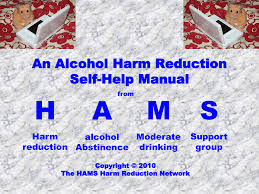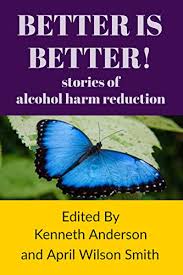…by April Smith…
What’s HAMS? If you don’t know about it yet, this guest post says it all: HAMS stands for Harm Reduction, Abstinence and Moderation Support. I’ve recognized and admired this organization for years, and I’m delighted to have April tell you more about it.
…………………………
I went to rehab at age 40 after a horrific crash that landed me passed out on a busy street in Philadelphia. I don’t rehash my story in public, but things were so bad that I was grateful that my parents made the huge financial sacrifice it took to send me to one of the oldest and most respected 12-Step rehabs in the country.
I dutifully did everything I was told, announced to everyone I met that I was an “alcoholic,” and earned the nickname “Recovery Supergirl.” Surprising for a Yale grad who had succeeded at everything? Maybe — until a series of traumatic events and alcohol-fueled relationships eventually landed her facedown on the concrete.
 Though outwardly I was the soul of enthusiastic compliance with my treatment, the questions were brewing. I didn’t think that character defects and self-centeredness had caused my alcohol problems. I had no interest in spending my life confessing my sins to strangers. And I wasn’t convinced that a lifelong abstinence from any mood-altering chemical (except caffeine, sugar and nicotine!) was the only answer.
Though outwardly I was the soul of enthusiastic compliance with my treatment, the questions were brewing. I didn’t think that character defects and self-centeredness had caused my alcohol problems. I had no interest in spending my life confessing my sins to strangers. And I wasn’t convinced that a lifelong abstinence from any mood-altering chemical (except caffeine, sugar and nicotine!) was the only answer.
From reading Marc’s Memoirs of an Addicted Brain, I went on to read the many others who have brought to light real science and common sense about addiction: Johann Hari, Carl Hart, Stanton Peele, and others. I started writing comments on Marc’s blog, and Marc asked me to turn one comment into a guest post.
A man named Kenneth Anderson found the post and friended me on Facebook. He is the Founder and Executive Director of a group called Harm Reduction, Abstinence and Moderation Support (HAMS) for Alcohol. HAMS is a worldwide organization with a vibrant, supportive and non-judgmental Facebook presence, live chats, a forum, and useable, evidence-based tools.
I joined HAMS in a moment of crisis. After about a year of complete abstinence after rehab, I decided to try drinking moderately. I sat down at a bar I had once frequented, had a glass of wine, ordered a second and drank only half of it before pushing it away and heading home.
My then-boyfriend freaked out: “You’re drinking again! You know you can’t drink because you’re an alcoholic!”
The absurdity of it hit me like a bottle of beer smashed over my head. I had a glass and a half of wine. Nothing happened. The world did not end.
In HAMS, I found a community that supported me, no matter what my alcohol choices were. We support all goals, not just abstinence. We do not require or recommend that people who have problems with alcohol stop drinking forever.  We don’t require anything, other than that members treat each other with respect and not judgement. We support abstinence (a word we prefer over “sobriety,” as “sober” has moral connotations), moderate drinking, and safe drinking.
We don’t require anything, other than that members treat each other with respect and not judgement. We support abstinence (a word we prefer over “sobriety,” as “sober” has moral connotations), moderate drinking, and safe drinking.
It wasn’t long after I started to work with Kenneth that I became the leader of HAMS for Women, a subgroup of women who are trying to change their drinking. In HAMS for Women, we refer to each other as “ladies,” because women who drink have too often been described by derogatory names — anything but ladies. We carefully moderate the group to make sure that shaming, blaming, and judgmental comments are kept off.
We don’t just talk about alcohol, though. We talk about spouses, children, and we post pictures of our pets! We’ve had extremely sad moments: the day we learned of the death — from cirrhosis — of a woman we had seen through crisis after crisis as her abusive husband kept pushing things just a bit further, all the while keeping her too drunk to work and make a living. We exchange stories we dare not tell in public. In this group we find nothing but love and support.
 For me, HAMS has been a critical part of rewriting my identity. The label “alcoholic” seemed to erase everything I had been before, and everything I might be in the future. No matter what I did, even when I didn’t drink, I felt shame. HAMS has taught me that the content of my bloodstream is not the content of my character. Now my identity is not defined by my relationship to alcohol. I am not an “alcoholic.” I am April Wilson Smith.
For me, HAMS has been a critical part of rewriting my identity. The label “alcoholic” seemed to erase everything I had been before, and everything I might be in the future. No matter what I did, even when I didn’t drink, I felt shame. HAMS has taught me that the content of my bloodstream is not the content of my character. Now my identity is not defined by my relationship to alcohol. I am not an “alcoholic.” I am April Wilson Smith.
Many HAMS members learn to successfully moderate, using HAMS tools such as counting your drinks and deciding on a limit in advance. Contrary to the (irrational) idea — promoted by AA and the popular press — that one drink will ruin your life, HAMS members are often able to achieve moderation, even if they had serious problems with alcohol before. Many choose to abstain altogether, a choice we applaud as well. Our motto is, “Better is Better!”
I recently had the opportunity to interview Kenneth for Filter Magazine. See the full interview here.
 HAMS has just published an e-book, priced at $0.99, relating the stories of our members: their struggles and successes. We hope you’ll pick it up and check us out on Facebook. Here’s what Marc has to say about the book — an endorsement that joins praise by Maia Szalavitz, Stanton Peele, Johann Hari, and others.
HAMS has just published an e-book, priced at $0.99, relating the stories of our members: their struggles and successes. We hope you’ll pick it up and check us out on Facebook. Here’s what Marc has to say about the book — an endorsement that joins praise by Maia Szalavitz, Stanton Peele, Johann Hari, and others.
“Through these moving personal stories, we learn not only how HAMS works but how addiction works. And we learn that overcoming addiction doesn’t have to adhere to a rigid program or philosophy. HAMS succeeds because it connects with people who drink, on their own terms, respects their goals and wishes, recognizes their strengths and supports them where they need and want support. These little memoirs are as varied in style and substance as the individuals who wrote them, but they converge on themes that just don’t go away, including the inadequacy of AA for many who drink, despite its value for some. Intimately told, both raw and articulate, these memoirs reveal how people struggling with addiction can help each other through sensitivity and generosity rather than judgment and dogma.”
I had the pleasure of interviewing HAMS members for the creation of this book, and I saw the full range of improvements in their approach to drinking, without the aid of a Higher Power or even a therapist. They are living proof that all choices, not just abstinence, can work.
Better is better!

Leave a Reply to April Cancel reply